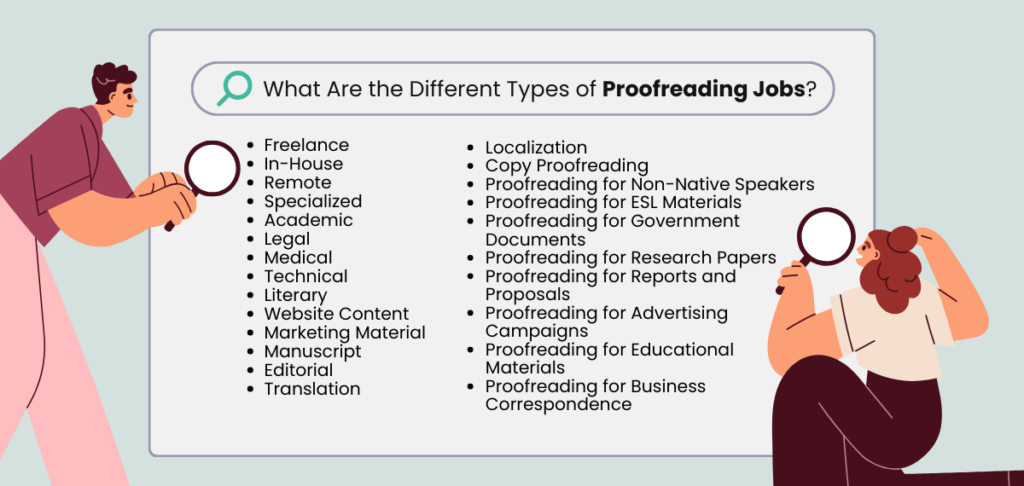Proofreading jobs differ slightly from editing jobs, but both can be tricky to land. Whether it’s freelance proofreading, in-house proofreading, or even remote or specialized proofreading, the right skills and qualifications will put you at the top of the list when finding jobs.
Career development doesn’t happen overnight. But if you want to set yourself apart from the thousands of other professionals applying for the same jobs as you, consider the tips I’ve included in this guide.
I’ve been around the block and have been working in the freelance industry for over fifteen years. I learned what it takes to stand out and how to land that perfect gig.
My guide covers a quick list of the most common proofreading jobs you’ll come across and the skills and qualifications you need, and it shares some of my own tips for finding and applying for proofreading jobs. Let’s get to it!
What Are the Different Types of Proofreading Jobs?

There’s more than one type of proofreading job? You bet! Just like most industries, there are various areas and niches that certain experts focus on because that’s what they excel in.
Here’s a quick list of some of the most common proofreading jobs that frequent job boards. Take a look and see which appeals to you and your growing skill set.
Freelance Proofreading
Arguably, this might be the dominant niche. The flexible world of freelance proofreading is where you can pick projects that match your interests, skills, and schedule.
This route is perfect for those seeking variety and control over their workload, as well as diversity in gigs. You could proofread a romance novel one week and then work through a series of blog posts the next.
In-House Proofreading
There’s always the option to join a team as an in-house proofreader, providing consistent support for a single company. These positions are usually a little harder to land because companies want to pick someone who’s right for their team. However, this path often offers stability and deeper involvement in projects.
Remote Proofreading
Think of this as a combo between the first and second options. With the rise of digital workplaces, remote proofreading jobs have flourished because they allow you to work from anywhere in the world, whether you’re freelance or in-house.
Specialized Proofreading
This is where things get dicey. Sure, we can build our skills to become a great proofreader for common spelling, grammar, and typographical errors. Plus, editing software like Grammarly Premium can be a major help.
However, specialized proofreading demands those key skills plus knowledge of certain industries and practices. Don’t get me wrong, though. Specialization can set you apart, whether it’s academic, legal, medical, or technical proofreading. Each area demands specific knowledge but promises rewarding challenges. Do any of these specialties appeal to you?
Academic Proofreading
This involves a meticulous process that makes sure scholarly articles, thesis papers, and other educational materials meet the highest standards of academic excellence.
That means correcting grammar and spelling errors and verifying adherence to specific academic styles and formats such as APA, MLA, or Chicago. We’ve got plenty of great guides on those, so be sure to check them out to familiarize yourself!
Academic proofreaders definitely need a deep understanding of these guidelines and the subject matter so that the academic arguments are presented clearly and credibly, supporting the integrity of scholarly work.
Legal Proofreading
You need precision and a thorough understanding of legal terminology and document formats for this niche. Whether you’re dealing with contracts, briefs, legal opinions, or other documents, every word must be exact because even minor errors can have huge implications.
A strong background in law definitely doesn’t hurt, but an eye for detail and general knowledge of the industry would work.
Medical Proofreading
These proofreaders are known for scrutinizing medical documents—including research papers, clinical trial reports, patient information leaflets, and more—for accuracy and clarity while ensuring compliance with medical terminology and ethical guidelines.
Of course, it requires a specialized knowledge base to accurately convey complex medical concepts and data. So, if you have a background in healthcare or life sciences, try your hand at medical proofreading.
My aunt spent most of her life as a nurse. When she was semi-retired, she needed something to fill her time, so she became a medical writer and proofreader. A lifetime of experience gave birth to a new career!
Technical Proofreading
This covers a wide range of documents, from user manuals and technical reports to engineering specifications and instructional guides. Proofreaders in this domain check that technical jargon is used correctly and that information is presented clearly and logically.
Literary Proofreading
Arguably, it’s the most common in the freelance forum. This is the dream job for those who are passionate about books (like me!). This includes novels, poetry, plays, and other literary works. It’s not just about spotting typos but respecting the author’s voice while ensuring the text is polished and coherent.
Literary proofreaders get to immerse themselves in diverse narratives, working closely with authors to bring their visions to life and ensuring that the final manuscript is ready for the eager eyes of readers. It’s so rewarding if you can master the skills!
Website Content Proofreading
In the digital age, website content proofreading has become increasingly important. This proofreader checks that online content is not only free of errors but also engaging, clear, and optimized for search engines (SEO-friendly).
It’s best if you understand web writing practices, including keyword integration and user experience principles.
Marketing Material Proofreading
Are you great at examining advertisements, brochures, and other promotional content to ensure they are persuasive and error-free? Consider becoming a marketing proofreader!
Proofreaders in this niche need a keen eye for both language and visual layout so that marketing messages are clear, compelling, and targeted to the right audience.
Manuscript Proofreading
This is the most traditional form of proofreading in the publishing world. Manuscript proofreaders prepare authors’ manuscripts for publication. It’s all about having a detailed review of the text for grammar, spelling, punctuation, and formatting errors, ensuring the manuscript is polished and ready for the next stage of the publishing process.
Editorial Proofreading
If you love the idea of collaborating with editors on articles and features for magazines, newspapers, and online publications, then give this niche a go. Editorial proofreaders check that content is engaging, accurate, and aligned with the publication’s style guide.
Translation Proofreading

If you speak or write in multiple languages, you might want to consider translation proofreading. I know, just in the fiction author world alone, this skill is highly sought after by indie authors who’ve had their books translated into different languages.
Localization Proofreading
This goes beyond translation to adapt content to fit specific cultural contexts, making sure it resonates with local audiences. This involves language changes and adjustments to cultural references, imagery, and formatting to fit the region or location at hand.
A good example is where I come from—Newfoundland, Canada. We have a very specific culture made up of English, Scottish, and Irish. Also, our province’s largest industry is tourism. A localized proofreader would be absolutely necessary to review any marking material created so that it captures our culture just right.
Copy Proofreading
This focuses on commercial copy, like product descriptions, promotional materials, and advertising copy. Copy proofreaders check that the copy is compelling, error-free, and captures the brand’s voice.
Proofreading for Non-Native Speakers
If you ask me, this one is super duper specialized because you have to deal with documents written by authors for whom English is not their first language. These proofreaders must be sensitive to language challenges and able to clarify meaning without altering the author’s intended message.
Proofreaders in this field help non-native speakers communicate their ideas clearly and professionally, bridging language barriers in academic, business, and literary contexts.
Proofreading for ESL Materials
English as a second language (ESL) materials need a proofreader who nails educational content for English learners. They make sure everything is accurate, clear, and pedagogically sound. This includes textbooks, online courses, and study guides.
Proofreading for Government Documents
Are you a sucker for pain? Proofreading government documents demands high precision and adherence to formal standards. Government proofreaders review legislation, policy documents, and public communications so that they’re clear, accurate, and accessible to the public.
Proofreading for Research Papers
This is all about ensuring the accuracy and clarity of academic language and adherence to specific formatting guidelines like APA, MLA, or Chicago style. It’s not just about grammar and spelling; it’s about maintaining the integrity of scientific communication.
This type of proofreading demands familiarity with academic jargon and an understanding of citation rules to ensure the research is presented credibly and professionally.
Proofreading for Reports and Proposals
Proofreading is crucial to presenting data and ideas clearly and persuasively in reports and proposals. This role involves scrutinizing documents for coherence, logical flow, and precise language that aligns with the objectives of the report or proposal.
Proofreading for Advertising Campaigns
Advertising campaigns need copy that is engaging, error-free, and aligned with the brand’s voice. This type of proofreading scrutinizes headlines, body copy, and call-to-actions for clarity, creativity, and impact.
The goal is to captivate the audience and drive the desired action without any distractions from errors that could undermine the campaign’s effectiveness.
Proofreading for Educational Materials
You need a keen eye for detail to ensure the content is accurate, accessible, and age-appropriate. This includes textbooks, e-learning modules, and classroom resources across various subjects.
The proofreader checks that instructional content is clear, engaging, and free of errors that could confuse learners or detract from the educational objectives.
Proofreading for Business Correspondence
In most business correspondence, precision and professionalism will make or break content. Proofreading business letters, emails, memos, and reports involves checking for clarity, tone, and adherence to corporate style guides.
This makes sure that all forms of communication uphold the company’s image, convey messages effectively, and foster positive relationships with clients, partners, and employees.
What Skills and Qualifications Are Essential for Proofreading?
Aside from being good at catching typos, here are a few other key skills you might want to consider building.

Strong Command of Language
Obviously, an impeccable grasp of the language is non-negotiable here, enabling you to spot and correct errors effortlessly.
Attention to Detail
The ability to catch the slightest inconsistencies is what makes a great proofreader stand out from the rest.
Time Management
Juggling multiple projects without missing deadlines is a key skill in the fast-paced world of proofreading. We all struggle here! But lists, agendas, and reminders can really help juggle it all.
Communication Skills
Clear communication with clients or team members is so important these days, especially for understanding project requirements and providing feedback.
Technical Proficiency
Familiarize yourself with word processing software, content management systems, and basic HTML. Trust me, it can be a huge advantage and will make your job much easier.
What Are Some Tips for Finding and Applying for Proofreading Jobs?
You can’t just hop on a job board and start applying to every gig listed. Follow these key steps first before you jump:
- Build a Solid Foundation: Gain a strong command of language and proofreading techniques. Offer your services pro bono to build some experience.
- Get Certified: Although this isn’t always required, certification can totally boost your credibility.
- Create a Portfolio: Showcase all of your best work to attract potential employers or clients, especially if you’re in a niche.
- Utilize Job Boards and Networking: When you’re ready, explore opportunities on platforms like LinkedIn, Indeed, Upwork, and specialized editing job boards.
- Pitch Your Services: If there’s a specific place you want to work, don’t hesitate to reach out to them with tailored proposals. You never know who’s looking!
How Can You Develop Your Career in Proofreading?
If there’s one thing I’ve learned, this question gets different answers depending on what you want out of your career. With that being said, here are a few quick points to consider:
- Continuous Learning: Always, always, always stay updated with the latest in language usage, technology, and your area of specialization.
- Networking: Connect with your peers and fellow professionals through forums, associations, and social media to share tips and find opportunities. I’ve landed tons of great gigs from binder groups on Facebook!
- Diversifying Your Skills: Broadening your skill set to include editing, localization, or even niche-specific knowledge can open new doors and expand your client base.
- Seeking Feedback: Never reject constructive criticism. It’ll help refine your skills and approach to proofreading.
- Advancing to Leadership Roles: With experience, you might lead a team of proofreaders, manage large projects, or offer consultancy services. The sky is the limit, people!
Are You Ready to Find a Proofreading Job?
Launching or building a proofreading career can be scary. Just make sure every piece of writing you touch communicates its message with clarity and precision. Whether you choose the freedom of freelance work, the stability of an in-house position, or the challenge of specialized proofreading, there’s a world of opportunities waiting for you.
We covered types of proofreading jobs, skills, and qualifications and even listed a few tips for finding and landing proofreading jobs. I hope you learned a thing or two! Be sure to study our other guides if you want to build your career as a great proofreader.
